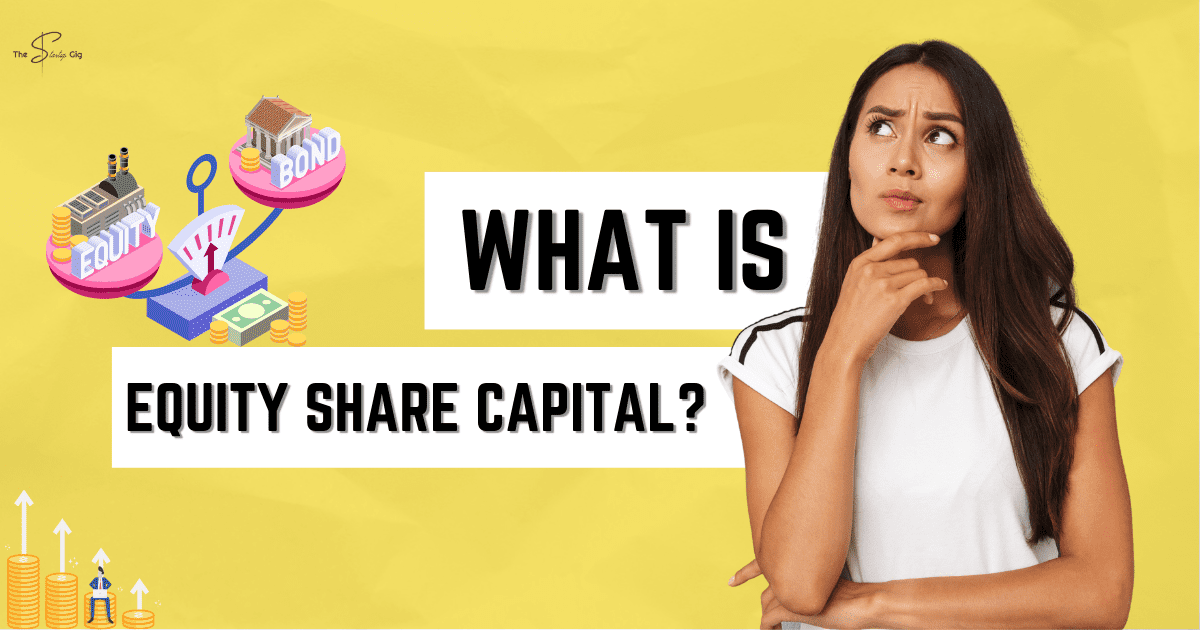Equity share capital means the capital raised by the company by issuing its shares. It is also known as “risk capital.”
- To meet funds requirements, the company allows the general public to become shareholders by subscribing to its shares. The investor gives money by purchasing a company’s shares. Hence, the capital that is raised by issuing shares of the company is known as “equity share capital.”
- Once the shares are issued in an initial public offering or IPO, they become a regular source of revenue for the company. At the same time, all the equity shareholders enjoy the benefits. They then own the company and receive dividends on the shares they purchased. At the time of company liquidation, shareholders have the right to get shares in the remaining assets.
- The main objective behind issuing to the general public through an IPO is to raise funds for the company’s growth and expansion. When shares of a company get listed on the stock exchange, the public can easily buy and sell them whenever they want.
Features of equity share capital
Now that you know what equity share capital means, to make it more clear to you, here are the features of equity share capital:
- Permanent Nature
The shares that are issued by the company to the general public are non-redeemable and permanent. These shares cannot be returned until the company is liquidated.
- transferable and dividend pay-out
The equity shares are transferable by nature, which means that you can easily transfer these shares’ ownership to someone else.
The equity shareholders receive a dividend on the shares. The amount of the dividend is totally dependent upon the profit the company generates in a particular year. So, whenever a company faces a loss, you don’t get any dividends.
- High-return potential
There is no doubt that investing in shares is really risky because they are volatile. However, taking risks is worthwhile because the returns on these shares are enormous.
So, if you are ready to take the risk of investing in shares, then equity shares are the right choice for you. Anyone can make good money by investing in equity shares.
Types of equity share capital
Now that you know what equity share capital means and its features, we think that you’ve made up your mind to invest in equity share capital.
So here are some of the types of equity share capital:
- Ordinary shares
This is the first type of equity share. The main reason behind issuing ordinary shares is to generate capital to cover long-term expenses. People who have purchased the shares have the right to participate in the management of the company. Investors who own a majority of the company’s shares have voting rights.
- Preference equity shares
These shares are issued to investors to ensure the payment of accumulated dividends. The shareholders also enjoy preferential rights. These shares have limited voting rights compared to ordinary shares.
- Authorised share capital
It is the maximum amount of money that a company can raise by issuing its equity shares. However, the companies are not required to issue the full amount of authorised share capital. If they follow all rules and regulations, they are permitted to increase the authorised share capital.
- Issues of share capital
In issued share capital, applications are invited from the public, but they have to be within the limits of authorised share capital. It also cannot be issued in excess of the authorised share capital. It is also known as the “called-up capital.”
- Subscribed share capital
It is a part of the issued share capital that is subscribed to by investors. When members subscribe for shares, the company’s subscribed capital increases. The capital that is left from the subscribed share capital is known as the “unsubscribed share capital.”
- Paid-up capital
It is a portion of the subscribed capital. It is also known as “up capital.” It means the amount that has been paid by the investors. In many cases, investors pay the full share price. However, in some cases, investors pay in instalments on the first call, the second call, and so on.
- Bonus Shares
These are defined in Section 63 of the Companies Act of 2013. These are the additional shares that are issued to the existing shareholders without any extra cost. These shares are the company’s accumulated earnings, which are not distributed but converted into free shares.
- Right Shares
These shares are defined under Section 62 of the Companies Act of 2013. These are the shares that give the right to all the shareholders to purchase additional shares of the company at a lower price compared to the market price.
- Shares of Swear Equity
These shares are issued by the companies to their employees and workers for their hard work. These shares are also offered at a lower price than the market price.
Benefits of Equity share capital
These are the benefits of equity share capital:
- Stock split
It is one of the main advantages of share. Stock split means the splitting of shares into smaller parts. It also decreases the price of the shares which makes them more liquid. By this, the large volume of shares leads to a rise in the company’s price. This way the stock split benefits the investors.
- High Liquidity
Liquidity must be considered before investing in any financial instruments. Liquidity means how easily can you convert your instrument into cash. Shares are known as one of the most liquid assets that someone can buy or sell in the market whenever they need. So, in case of any emergency, you can easily liquidate your investment.
- High income
Investors can receive high income from equity share capital. By purchasing equity shares in a company, you can easily generate a high income. You not only make a good living, but you also receive a consistent dividend.
Conclusion
Any company must have equity-share capital to launch operations and guarantee the viability of its enterprise. The risks of overcapitalization and undercapitalization, which can jeopardise any company’s viability, must be recognised by a company. Therefore, it’s critical to ensure that there is enough equity share capital to cover the startup costs of the business and support its expansion.





